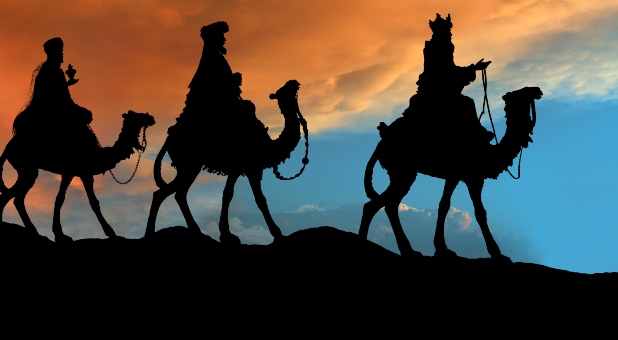Christmas Isn’t Over Until the Wise Men Arrive
When I was a child, Christmas always seemed like a huge letdown. There was a buildup to the holiday in December, with parties, family visits and the expectation of gifts. But then it all came to a screeching halt on Dec. 26. Our family’s decorations went into the attic, Christmas merchandise disappeared from store shelves (replaced overnight by Valentine’s Day candy) and radio stations abruptly stopped playing Christmas music.
I hated the disappointment. Seeing something so wonderful vanish so suddenly made me sad.
Thankfully, I’ve since learned that Christians throughout the centuries actually started celebrating Christmas on Dec. 25, and did so for 12 days—hence the song “The Twelve Days of Christmas.” They ended their festivities with the day of Epiphany—a special time to remember the wise men, or magi, who visited the baby Jesus in Bethlehem.
The wonder of Christmas can’t be jammed into just a few days, so why are we always in such a hurry to end it? My decorations stay up longer now, so I can squeeze every bit of Christmas joy out of the season. And that’s why I’m grateful for the visit of the magi. They showed up late for the party, but they had an important role to play in the coming of the Savior. Don’t leave them out of the story!
The magi are only described in Matthew’s Gospel. Drawn by the star that appeared over Bethlehem, they arrived from afar to see the infant Jesus, and they brought the strangest baby gifts ever: gold, frankincense and myrrh. Who were these men, and why did they give Jesus these expensive presents after they “fell to the ground and worshiped Him” (Matt. 2:11b, NASB 1995).
The magi were most likely priests or astronomers from what is now Iran, or possibly Saudi Arabia. (We always assume there were three of them, but the Bible doesn’t say that—only that they carried three gifts.) They were not Jews, yet they felt drawn to Bethlehem because they sensed something earthshaking was happening there, based on their research. From their own calculations they knew a baby had been born who was “King of the Jews” (Matt. 2:2). And they knew His reign and influence meant something profound for them, too.
There are three things we should ponder as we remember the visit of the magi:
- Their mission was prophetic. The wise men were sent to be witnesses of Christ’s true identity. They believed the prophecy of Micah, who predicted that the Messiah, the “Ruler” of Israel (Matt. 2:6), would be born in Bethlehem. When they knelt and worshipped the baby, they were inviting us to do the same.
- Their gifts were prophetic. Gold symbolizes royalty, reminding us that Jesus is truly the King of kings. Frankincense was used by temple priests, and it shows us that Jesus, our High Priest, carries our prayers to God as our mediator. Myrrh is a fragrant perfume used to embalm dead bodies; it showed us that this King would die for us. Even when the baby was lying in a manger, His cruel death on a cross was foretold.
The gifts fulfilled a prophecy in Psalm 72: “Let the nomads of the desert bow before him, and his enemies lick the dust. … the kings of Sheba and Seba offer gifts. And let all kings bow down before him, all nations serve him” (Matt. 2:9-11).
- Their ethnic background was prophetic. The magi were foreigners, yet they were paying closer attention to the Jewish Scriptures than the Jews themselves. They came from a far country to worship the Messiah, paving the way for a Gentile church. The magi came to show us that Christ came for the whole world, not just for an elite few. They pointed at Jesus and signaled to people from every continent: “This is your King, too.” (It is truly fascinating that hundreds of thousands of Iranians are embracing faith in Christ today!)
What should be our response? We too should fall to the ground. He is our King, high priest and Savior. He is not only King of the Jews, but also King of the whole earth. He deserves our wholehearted worship. {eoa}
Read articles like this one and other Spirit-led content in our new platform, CHARISMA PLUS.














































